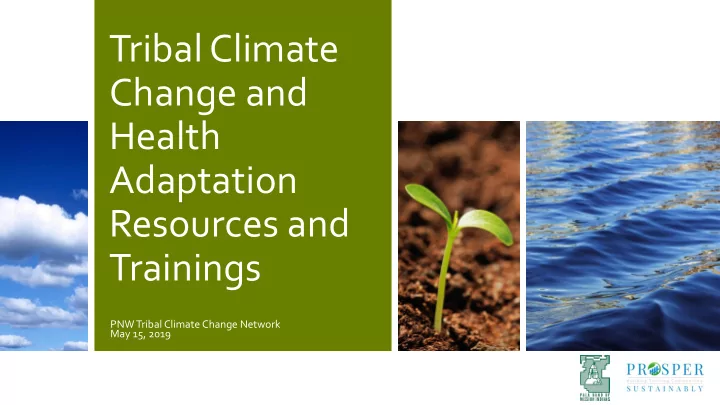

Tribal Climate Change and Health Adaptation Resources and Trainings PNW Tribal Climate Change Network May 15, 2019
Climate and health: an urgent matter • Just yesterday: "This moment is one of extraordinary consequence. Actions taken by all nations over the next decade will determine whether global health will continue to improve or whether it will instead decline — possibly catastrophically so — as a result of climate change.“ “Health professionals can make a critical difference." 2
Pala Band of Mission Indians (Northern San Diego, CA) National collaboration and leadership on climate and health adaptation Federal funding Pala Prosper Advisory Group Sustainably Climate Ready Tribes Collaborative Climate Adaptation Capacity Building for Tribal Community Wellbeing Website & Trainings & Assessment/ Pala Intertribal Resource companion Plan/Survey Adaptation Sharing Clearinghouse tools Templates 3
Climate changes wellbeing differently in different places Tribal examples: • Pacific Northwest and Great Lakes tribes : fish, food, and forests • Navajo : heat and water insecurity • Mojave : shrinking river (spirituality) • Seminole Tribe of Florida : hurricanes and sea- level rise • Alaska coastal tribes : thawing, erosion and hunting • Lakota (South Dakota): Bomb cyclone and flooding • Pala (Southern CA): heat, wildfire, drought, flooding 4
Climate Change and Human Health Climate change is increasing the number of people at greater risk of human health threats such as illness, injury, death, trauma and other mental and psychosocial consequences USGCRP Climate and Health Assessment Key Findings • Increased exposure to extreme events and coastal flooding will effect health • Disruptions to essential infrastructure can limit access to healthcare and emergency response services “Our environment was rich in the wealth of natural resources, providing all our needs, allowing us to live healthy happy lives!” Puyallup Tribe 5
TCHP Framework “ Indigenous health is based on Tribal Climate Health Project defines health more broadly interconnected social and than the absence of medical ecological systems that are being disease; encompasses overall disrupted by a changing climate. wellbeing As these changes continue, the health of individuals and communities will be uniquely • Human health: challenged by climate impacts to physical and lands, waters, foods, and other plant and animal species. These psychological impacts threaten sites, practices, • Spiritual and cultural and relationships with cultural, spiritual, or ceremonial health importance that are foundational • Socio-economic to Indigenous peoples’ cultural health heritages, identities, and physical and mental health.” Key Finding, Fourth National Climate Assessment 6
TCHP Framework and Tools to Incorporate Health into Adaptation Planning Implement Vulnerability Adaptation Plan Adopt Evaluate Assessment Companion Tools • Online resource Steps Steps Update clearinghouse • 1. Determine Objectives Input gathering 1. Determine Objectives and Scope and Scope templates 2. Engage the 2. Compile “long list” of • Exposures, Impacts, Community Steps adaptation strategies and Strategies 3. Identify Key Indicators 3. Evaluate and Prioritize 1. Implement Inventory (EISI) tool 4. Gather and Analyze “Short List” of 2. Evaluate • Information Report templates Adaptation Strategies 3. Update 5. Prioritize 4. Organize Selected Vulnerabilities Strategies into an 6. Synthesize and Action Plan Present Results 5. Synthesize and Present Results 7
Psycho-social-spiritual Resilience Strategies Pala CRT Activity: Develop and distribute digital and Provide health hard copy materials to increase community awareness education & of climate health threats, including a new webpage psychoeducation and listserv for related notifications Pala CRT Activity: Formalize adaptation committee to build community wellbeing by Improve Psychosocial Build Connection communication Resilience working together on ongoing climate initiatives, including adaptation implementation and evaluation Pala CRT Activity: Evaluate existing health and Deliver health and psychosocial first aid services and develop a psychological first collaborative referral system to respond to climate aid resources events
Wrapping Up Next Steps for TCHP • Conduct trainings • Produce and distribute tools and resources • Follow us at: • Tribalclimatehealth.org • facebook.com/tribalclimatehealth/ • Q&A 9
Angie Hacker Shasta Gaughen 805-234-5131 760-891-3515 ahacker@prospersustainably.com sgaughen@palatribe.com Thank You Acknowledgements • US Environmental Protection Agency • US Bureau of Indian Affairs • Members of the TCHP Advisory Group • National Indian Health Board
Recommend
More recommend